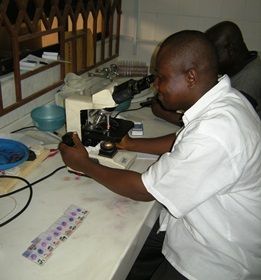Human Resources &MIM2013 Bill Brieger | 29 Sep 2013 10:52 am
Human Resources for Malaria
Two major international meetings are coming up in the next two months. One if the Multilateral Initiative for Malaria’s 6th Pan-African Malaria Conference (MIM2013) and the Third Global Forum on Human Resources for Health. Neither apparently cross-reference the other. None of the Plenary Sessions or Symposiums at MIM2013 explicitly address the crucial need of appropriate human resources to eliminate malaria, though we are sure it will be woven in to several presentations.
 One of the most prominent focal points for malaria human resources arises from the effort to expand integrated Community Case Management (iCCM). The American Journal of Tropical Medicine and Hygiene features a special supplement launched at its 2012 annual Conference on iCCM. The most interesting aspect of the iCCM movement is the innovative task shifting that is occurring to bring malaria and other disease solutions to the grassroots through a variety of auxiliary health workers and community volunteers. It has become clear that malaria treatment coverage cannot meet targets – either the 2010 Roll Back Malaria goal or 80%, let alone the push toward universal coverage – without involving non-formal providers such as volunteer community health workers (CHWs) as well as patent medicine shop staff.
One of the most prominent focal points for malaria human resources arises from the effort to expand integrated Community Case Management (iCCM). The American Journal of Tropical Medicine and Hygiene features a special supplement launched at its 2012 annual Conference on iCCM. The most interesting aspect of the iCCM movement is the innovative task shifting that is occurring to bring malaria and other disease solutions to the grassroots through a variety of auxiliary health workers and community volunteers. It has become clear that malaria treatment coverage cannot meet targets – either the 2010 Roll Back Malaria goal or 80%, let alone the push toward universal coverage – without involving non-formal providers such as volunteer community health workers (CHWs) as well as patent medicine shop staff.
But finding human resources for treatment tasks is only the tip of the iceberg. A variety of health workers are needed for malaria work in the areas of entomology/vector control, health information systems/surveillance, and laboratory/diagnosis, to name three.
The Global Health Workforce Alliance did issue a report in 2011 that questioned the ability of countries to meet Millennium Development Goal number 6 – reducing the inpact of HIV, TB, Malaria and other endemic diseases. Issues such as the distribution of health workers in a country were raised – especially the challenge of meeting the needs of rural areas where malaria is more common.
Training has a major role to play. When Jhpiego/MCHIP began a 3-year effort with USAID to improve malaria services in Burkina Faso in 2009, they found a need to provide in-service training on malaria for newly graduated nurses and midwives. An examination of the curricula of the various cadres and branches of the National School for Public Health (ENSP) found a paucity of malaria content, especially content that reflected current national malaria guidelines from the Ministry of Health. This led to work with the ENSP to set up a planning committee to update the malaria components of its curricula.
 WHO has a variety of training materials on issues and cadres ranging from strengthening malaria laboratory workers, entomology and vector control staff, as well as the basic training of health workers involved in malaria case management.
WHO has a variety of training materials on issues and cadres ranging from strengthening malaria laboratory workers, entomology and vector control staff, as well as the basic training of health workers involved in malaria case management.
In addition to issues of health worker number are the issues of retention and performance quality. Researchers in Kenya are undertaking a study that will test whether a pay-for-performance (P4P) will improve malaria case management. Pay incentives might aid retention as well as improve quality of care. We need more such efforts to tackle the coverage gaps in malaria service delivery. This also means addressing the human resource gaps among malaria researchers in national institutes and universities in endemic countries.
We need to use every forum available to discuss human resources for malaria control, elimination and eradication. The scourge of malaria will linger as long as we lack the quantity and quality of human resources to fight the disease.